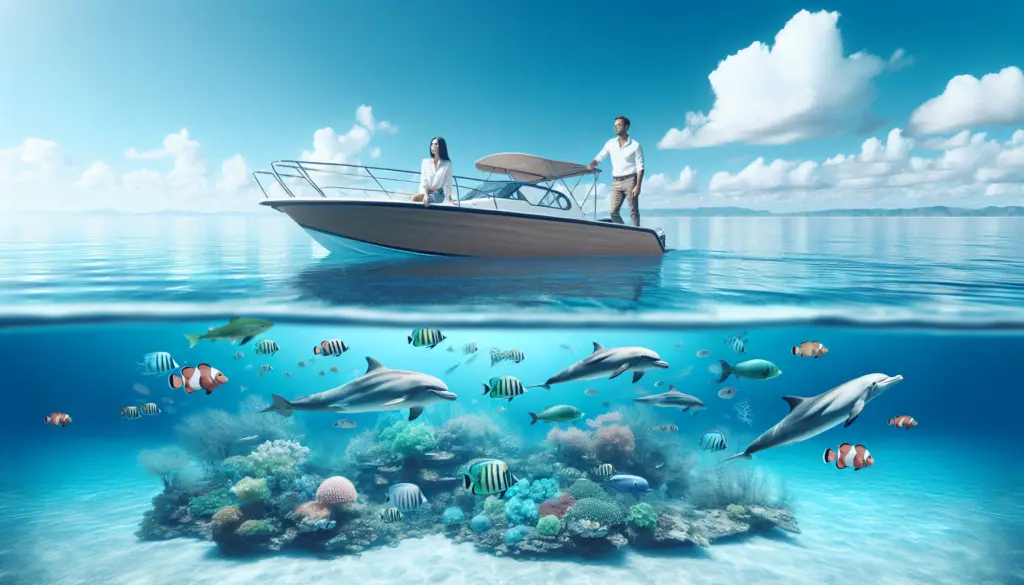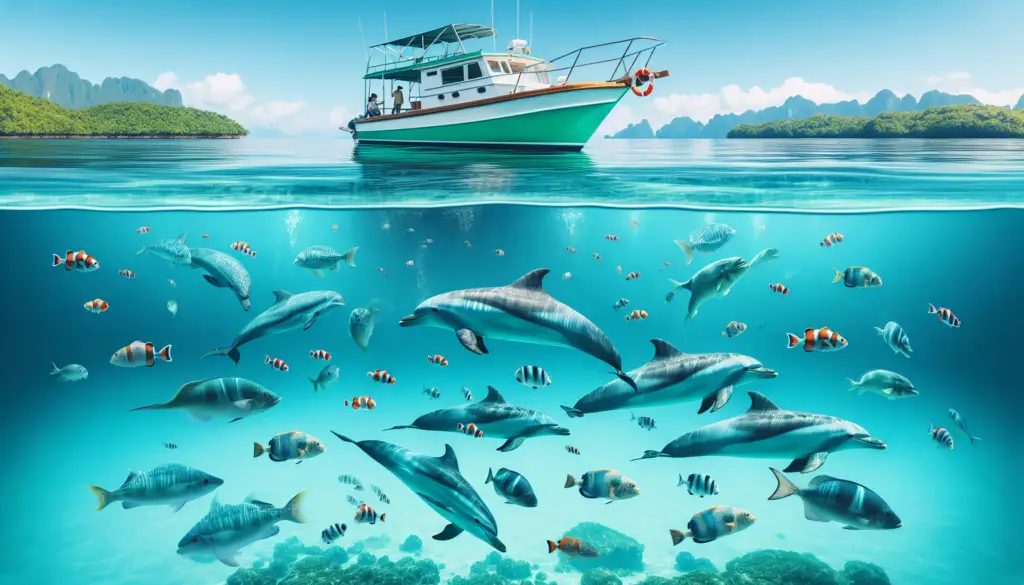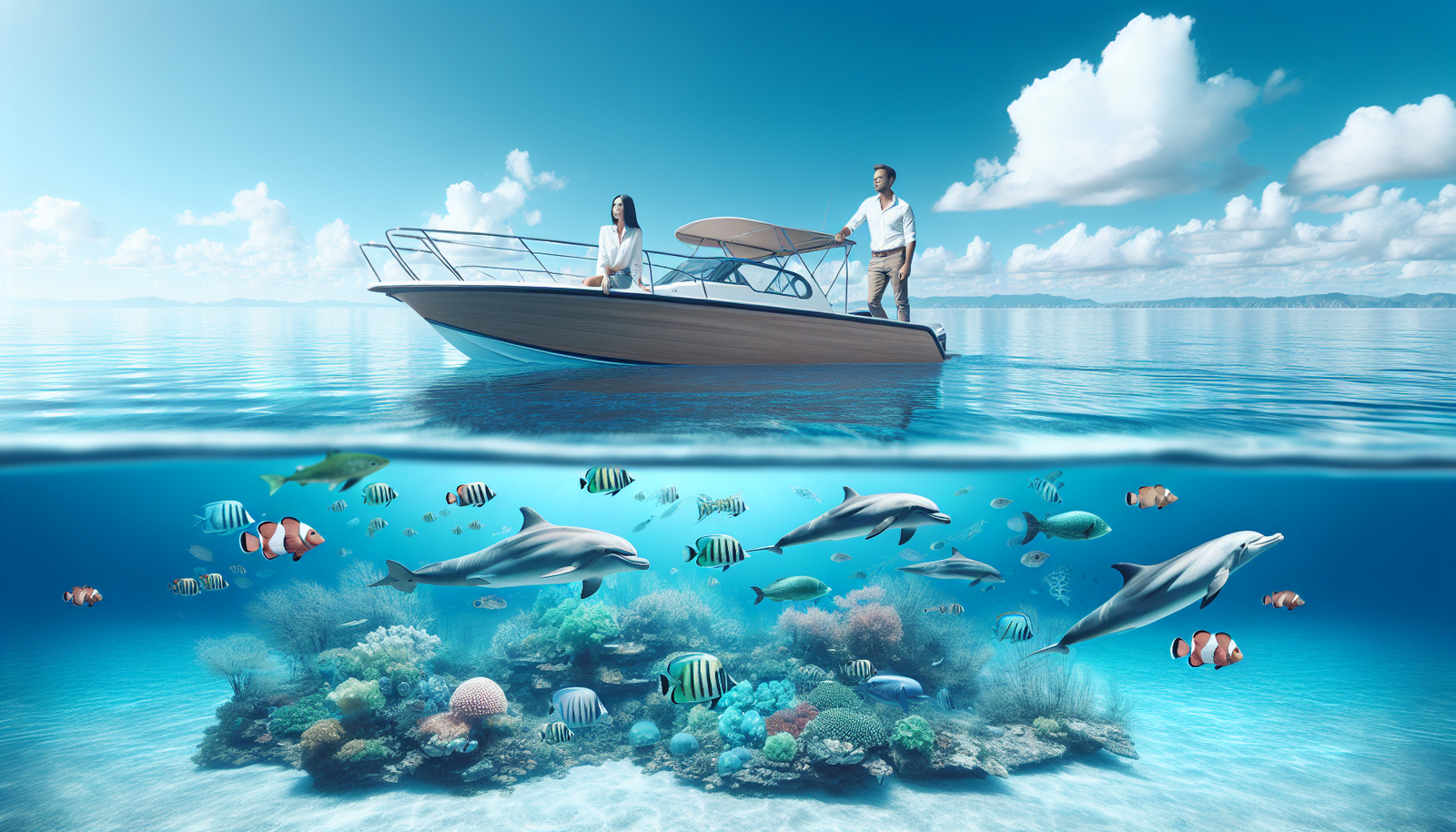You’re out on the open ocean, the salty wind wisping through your hair, and the calming rhythm of the waves lulling you into a sense of peace. The freedom you feel while boating is unmatched, a testament to nature’s grandeur and power. Yet, beneath the surface of the azure depths, a symphony of life unfolds, one that requires our respect and protection. This article, “Protecting Marine Life: Tips For Responsible Boating,” provides invaluable insights on how we can enjoy our love for the sea while maintaining a symbiotic relationship with its rich biodiversity.

Understanding the Importance of Protecting Marine Life
Marine biodiversity is of utmost importance, hosting a rich variety of species and ecosystems. We can appreciate marine life for its untamed beauty and endless mystery, yet above all, we should respect it for its vital role in our planet’s health. It regulates the climate, provides food, and also absorbs a significant amount of the carbon dioxide emissions we produce.
The Significance of Marine Biodiversity
Marine biodiversity encompasses all the microorganisms, plants, creatures, ecosystems, and genetic diversity in the ocean. Interestingly, it’s about more than just a wide array of distinctive species; it’s also about the diverse roles these species undertake in marine ecosystems. Marine life serves as a sort of biological pump, channeling nutrients from the deep oceans to surface waters. It’s essential to understand the value of marine biodiversity and how every species contributes to the planet’s overall wellbeing.
Threats Faced by Marine Life Due to Boating
Boating, perhaps surprisingly, can pose numerous risks to marine life. Boats can cause direct harm by colliding with marine animals or destroying delicate habitats with their anchors. Noise pollution from boats can disrupt marine life’s communication and behavior, while water pollution due to spillage, or improper waste disposal can seriously degrade water quality.
The Role of Responsible Boating in Marine Conservation
As a boater, you have a crucial role in marine conservation. Responsible boating involves operating your boat in a way that minimizes harm to marine life and their habitats. This includes watching your speed, avoiding sensitive areas, handling waste properly, and maintaining your equipment to reduce leaks and spills.
Getting Acquainted with Local Regulations and Guidelines
Just as road vehicles must adhere to traffic laws, boats have federal and state laws to abide by, as well as local regulations in specific waters.
Federal and State Boating Laws
Federal and state laws dictate safety requirements such as lighting and lifejacket provisions, as well as operational guidelines like speed limits and alcohol use while operating a boat. These laws are established not only for your safety but also to protect the aquatic environment.
Understanding Local Species and Their Protection
In specific regions, other rules may also be in place to safeguard local species and their habitats. For example, within marine protected areas, it may be illegal to anchor, fish, or even approach certain species. Boaters are obliged to acquaint themselves with these rules.
Seasonal and Location-Specific Guidelines
In addition, boaters must understand that seasonal and location-specific guidelines can apply. Certain areas can be off-limits during breeding season for certain marine life, while others might be sanctuary zones where boating activities are restricted all year long.
Equipping Your Boat Appropriately
Equipping your boat appropriately is essential, both for your safety and to minimize environmental impact.
Choosing Eco-Friendly Boat Equipment
Where possible, choose eco-friendly boat equipment. This might range from solar-powered systems to non-toxic cleaning products. By utilizing eco-friendly products, you are playing a vital role in reducing harmful chemicals entering our seas.
Proper Maintenance of Boat Equipment
Properly maintained equipment doesn’t just work better; it’s also less prone to leak oil, fuel, or harmful substances. Keep a close eye on your equipment and perform routine maintenance checks to ensure everything is running smoothly.
Dangers of Equipment Failure to Marine Life
An equipment failure could lead to oil leaks or even a complete breakdown. Such occurrences are not only dangerous for boaters but could have devastating effects on marine life too. A sudden oil leak could pollute vast areas, endangering countless plants and animals.

Practicing Safe and Eco-Friendly Anchoring
When it comes to anchoring, we should aim to do so without leaving a trace on the environment.
Choosing Suitable Anchoring Spots
It’s crucial to choose anchoring spots wisely, avoiding areas with sensitive habitats like seagrass beds or coral reefs. Using charts and marine GPS systems can help you identify a suitable place to anchor.
Correct Use of Anchors and Chains
Using anchors and chains properly minimizes their impact on the seabed. Ensure your chains have enough length to allow your anchor to rest flat, reducing the drag across the seabed.
Mitigating Impact of Anchoring on Marine Habitats
Consider the use of eco-friendly anchors which are designed to minimize damage to seafloor habitats. By anchoring responsibly, we can do our part in preserving these sensitive ecosystems for the generations to come.
Reducing Speed to Minimize Impact
While speed might excite many boaters, it’s harmful to the marine environment. Going too fast can increase erosion, disturb marine animals, and even lead to dangerous collisions.
Effects of Boat Wake and Wash on Marine Life
Boat wake and wash can have damaging effects on marine life. Increased wave action from boat wakes can cause erosion and disturb bottom-dwelling animals, while prop wash can churn up sediments and reduce water quality.
Safe Speed Regulations
Understanding safe speed regulations is key to protecting marine life. Boating at safe speeds not only help avoid collisions with marine wildlife but also reduce wake and wash, reducing impact on marine habitats.
Positive Effects of Slower Speeds on Marine Life
Slower speeds are less likely to disturb marine animals or churn up the sediment, help avoid collisions with marine wildlife, and also consume less fuel, leading to fewer emissions.
Avoiding Sensitive Areas and Marine Life
To ensure minimal disturbance to marine life, particularly in their delicate habitats, it’s crucial to avoid certain areas.
Spotting and Keeping Distance from Marine Wildlife
It’s essential to keep a respectable distance from marine wildlife to avoid disturbing them. Use binoculars for a better view, but never disturb a marine animal just for a close-up photo.
Navigating Around Coral Reefs and Sensitive Habitats
Boaters should be careful to avoid coral reefs and other sensitive habitats that can be easily damaged. Use available maps and GPS systems to navigate around these areas.
Impact of Human Interference on Marine Life
Human interference can be devastating for marine life, disrupting their natural behaviours and potentially causing them stress or harm. By maintaining our distance and allowing them to live undisturbed, we can help to preserve their environments and ways of life.
Operating the Boat Responsibly
Operating a boat responsibly goes beyond the basic rules of navigation. It’s about being considerate of the marine environment and wildlife.
Safe and Responsible Maneuvering Techniques
Safe and responsible maneuvering techniques, like slow speeds in shallow waters and cutting your motor if wildlife is close by, can minimize damage to habitats and risks to animals.
Reducing Noise Pollution
Boats generate noise, from the engine, music, and even shouting passengers. Noise pollution can disrupt marine life’s communication, hunting, and breeding behaviours. When possible, make an effort to minimize noise.
Importance of Adhering to Marked Boat Lanes and Paths
By sticking to marked boat lanes and paths, you are less likely to stray into sensitive habitats or come into conflict with marine wildlife. Make sure you understand local navigational guidelines and respect them.
Disposing of Waste Properly
A day out on your boat can generate a fair amount of waste. It’s essential to dispose of it properly.
Understanding the Implications of Marine Pollution
Marine pollution can stem from a wide variety of sources, including boats. Waste thrown overboard can poison marine life, smother habitats and can take years or even centuries to degrade, posing a long-term hazard.
Appropriate Onboard Waste Management
Onboard waste management involves storing waste securely until it can be disposed of properly. This means ensuring that waste can’t blow overboard or be washed overboard by a rogue wave or rain.
Significance of Clean-Up and Disposal at Designated Facilities
Making use of proper waste facilities preserves aquatic life and keeps our water bodies clean for recreational purposes. Dispose of your waste in designated facilities once you’re back onshore.
Promoting Responsible Fishing Practices
Responsible fishing practices go a long way in ensuring marine conservation.
Adhering to Catch and Release Principles
Adhering to catch and release principles can save countless fish lives. Proper catching and releasing techniques ensure that fish get a second chance to live and reproduce.
Using Fish-Friendly Gear and Equipment
Using fish-friendly gear, like circle hooks and knotless nets, can reduce the damage done to fish and increase their chance of survival if they’re to be released.
Understanding and Respecting Fishing Seasons and Limits
Fishing seasons and limits are in place to ensure sustainable fish populations. It’s important for all anglers to respect these restrictions, preventing overfishing.
Encouraging Others to Boat Responsibly
We can have a greater impact on marine conservation by encouraging others to join us in responsible boating.
Promoting Responsible Boating Within Your Community
Share your knowledge and enthusiasm for responsible boating within your community. Encourage friends, family, and other boaters to adopt eco-friendly practices and respect marine life.
Educating Future Boaters About Marine Conservation
For the younger generation of future boaters, education on marine conservation is vital. Introduce children to the marine environment and its species, and explain the importance of protecting them.
The Collective Impact of Responsible Boating on Marine Life Conservation
Every small action adds up. The combined effort of all boaters practicing responsible boating could significantly reduce the threats posed to marine life and turn the tide towards better marine conservation. Together, we can make a difference and protect our oceans for future generations to enjoy.


[…] may contribute to the problem. The insights covered in this piece will show you the importance of responsible boating for the preservation of our lakes, rivers, and […]